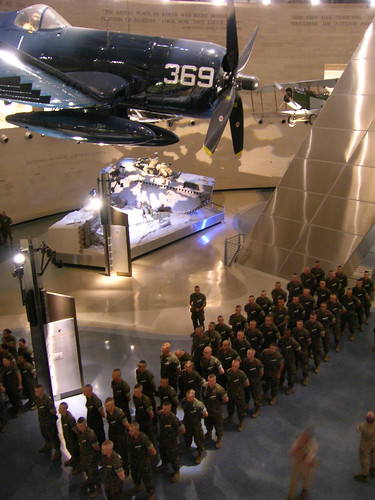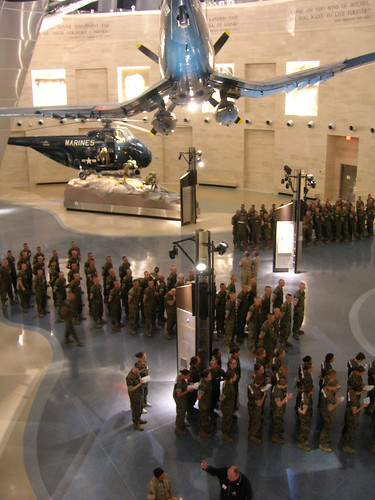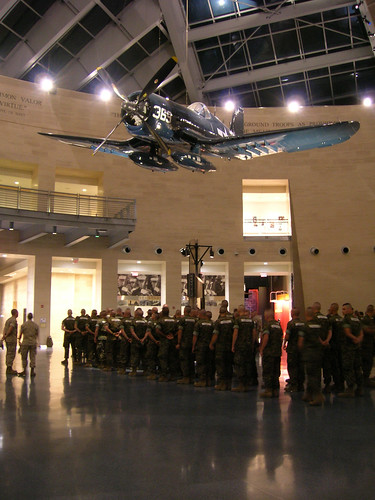
Thanks to an 8 hour floating holiday that I had to use or lose, I was able to help out with Friday night's visit. We had about 400 candidates come through. The first group, got quick overview tours. We, the docents, made our plans on the fly. There were three of us and four platoons of them. We each took a platoon and the fourth was spilt up by squad to the other platoons. The plan, one docent would take his group in the galleries from the beginning of Marine Corps History, the other would start in Leatherneck and I would start at the end (Vietnam) and then come out to Leatherneck.
Best laid plans did not work.
When I finished, the group in Leatherneck was still in Leatherneck. So I took everyone into Korea. Amazingly, I timed it just right and when we were done in Korea, the first group going through Legacy just passed us and the other group was coming up the hall, so I had my group pile on in to WW2 where I quickly walked them through. When we came out, the second group was just walking by. So I took my guys down to WW1 and out to Leatherneck Gallery. Whew! It was a bit of scrambling.
One thing that I found kind of cool, here was little old me, non-Marine, standing in the middle of a circle of an entire, all-male, platoon of 20-somethings, future Marine Corps officers, in utilities, all of them listening to me educate THEM on Marine Corps history. Kind of wild. Oh, and forgive me for that run-on sentence.

Today, an additional 250 came through and next week we'll have two groups of 400-plus each.
Yes, that's around 1600 Marine Corps Officers in the making. Not all of them will be graduating from OCS this summer, some are part of the Platoon Leadership Class (PLC). These are college students who go through 6 weeks of training in the summer between their junior and senior years of college and then finish up with the final six weeks the summer after they graduate from college.

The fun thing about giving these young men tours, they knew some stuff and they asked me questions - - some got longer answers than they wanted - -because I just got so excited about what they were asking me. History excites me. Being able to weave general world history into the Marine Corps story makes it come a live.
On that line, one of the Drill Instructors (and they don't call them drill instructors at OCS, however, I forgot the new title) asked me if I enjoyed working at the museum.
I told him I loved volunteering. He was surprised that we are volunteers, not paid staff. He was even more surprised to learn that I was not a Marine. I asked him what he did in the Marine Corps. Infantry. I asked him if he had been to Iraq, he had, the first battle for Fallujah. I mentioned I had read the book No True Glory. He said, he is in that book. I asked him where and what he did. He told me he is in the middle of the book, that he had won a pretty big award for his action. Of course, I go and ask, "What did you do." To that he replied he didn't like talking about it because he felt like he was bragging.
"I'll just have to look you up in the book." I said, "What is your name?"
"Sagredo."
I told him I actually liked listening to veterans stories because it made things seem more real for me, especially if I was meeting a real person I had read about. There is something personal about meeting the flesh and blood person. I mean words are so two dimensional. When you meet the PERSON, you've got a face, if you shook hands, you've actually touched them.
Now, I know I've mentioned this before. Sometimes I feel guilty after talking to a family member or a veteran - - because at the museum, I am just beaming. I love it here. I love telling the stories about the "things" and about the people I've learned about and met. However, often times, the stories and people they remember, are associated with probably the worst experience of their lives. I've had WW2, Korean and Vietnam veterans break down in tears in my arms because they remember the friends they lost and how they lost them; amputees and severally injured marines solemnly tell me about how they got blown up and the corpsman who saved their lives; family members who tell me of the loss of their child. It can be very emotionally draining at times.
I felt a little bad, because as Sagredo began telling me his story, I felt like I should be remembering it from having read it. I have found that so many of the stories start to melt together and I have a hard time remembering names and situations. I did go home and look up Sagredo's story, pages 148 through 154 of No True Glory. As soon as I started reading it again, I remembered it because what had stood out to me was the death of the Amtrac's crew chief, CPL Kevin Kolm. An RPG had penetrated the vehicle from one of the rear tracs, severely wounding the platoon commander and lodging into the engine, which burst into flame, trapping Kolm. They were deep in enemy territory, had to evacuate the vehicle and take cover in a home. 16 Marines, half of them wounded, had to fend off over 100 insurgents, for several hours. When help finally arrived, the Marines in the house were literally down to their last bullets.
I felt more guilty today after finding additional news articles about that day and how emotional it was for him to receive the Silver Star (third highest award for valor). He didn't want the award because according to one of the articles, it would remind him of that day. It was a day he thought it was going to come down to hand-to-hand combat, they might not survive it, he may never see his wife and children again. I don't want people to be thinking about the worst day of their life.
However, I will fall back to what Norm Hatch told his fellow Iwo Jima veterans, "You are doing your service and disservice if you don't tell your children and grandchildren your story."
I think it is very important for combat tested Marines to share their experiences with new recruits and officer candidates. Some of the officer candidates have seen combat, and they are a wealth of information for the "green" guys who haven't. You can go around being all macho, but when reality hits, you are, in the words of an Iwo Jima veteran, "So scared I didn't go to the bathroom for three days," and you do what you have to do. In some cases, some people perform beyond what anyone could have expected, while others, not so much.
It is the Sargredos in this world that I am grateful for, and others like him who haven't been recognized. They and their families make great sacrifices daily to provide folks like me with the freedoms we take for granted. I can also say, I won't forget his story.






2 comments:
My brother-in-law was there! He was part of the PLC group. I can't believe how many guys go through in the summer, way different from the winter class. Sounds like you guys did a good job with such a large group. I imagine hearing all of the stories would be emotionally draining, but very worth it. I'm so glad you enjoy your time there, it sounds amazing. How did you get involved?
I got involved after seeing a sign at the Patton Museum in Kentucky, "Does the thought of working on tanks sound like fun to you? Looking for volunteers in Restoration, inquire within."
Kentucky is a little far, so when I got back to DC, I called the Restoration of the Marine Corps Museum and asked if I could volunteer. They said yes, I started volunteering and the rest is history.
Post a Comment